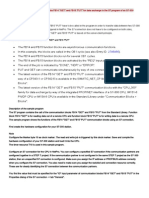"Enter A Number:": Def If Return Else Return
Uploaded by
Aparna Pai"Enter A Number:": Def If Return Else Return
Uploaded by
Aparna PaiIn
[5]: #factorial using recursion
def fact(n):
if (n == 0 or n == 1):
return 1
else:
return n * fact(n-1)
N = int(input("Enter a number:"))
print(fact(N))
Enter a number:6
720
In [6]: # fibonacci from another file
from fibonacci import fib
n = int(input("Enter a value for n:"))
result = fib(n)
print("nth fibonacci number :",result)
Enter a value for n:6
nth fibonacci number : 5
In [7]: # read from file and print unique words in sorted words
file = open("data.txt",'r')
rtext = file.read()
rtext = rtext.lower()
rwords = rtext.split()
rwords = [rwords.strip('.,!,(,),[,],?') for rwords in rwords]
unique = []
for rwords in rwords:
if rwords not in unique:
unique.append(rwords)
unique.sort()
print("\nThe sorted unique words are:")
print(unique)
The sorted unique words are:
['am', 'are', 'hello', 'how', 'hungry', 'i', 'yes', 'you']
In [8]: #polynomial solving
n = int (input ("Enter number of coefficients:"))
poly = []
for i in range (0, n) :
coefficient = int (input ("'Enter element " + str(i+1) + " : "))
poly.append (coefficient)
print ("Coefficients are:", poly)
x= int (input ("Enter a value for x : "))
result = 0
for i in range (n) :
sum = poly[i]
for j in range (n -i-1) :
sum = sum * x
result = result + sum
print (result)
Enter number of coefficients:4
'Enter element 1 : -2
'Enter element 2 : 6
'Enter element 3 : 2
'Enter element 4 : 1
Coefficients are: [-2, 6, 2, 1]
Enter a value for x : 2
13
In [1]: #sort list by length of elements
a = []
n = int (input ("Enter number of elements:"))
for i in range (0, n) :
b = input("Enter element " + str(i+1) + " : ")
a.append(b)
a.sort(key = len)
print(a)
Enter number of elements:4
Enter element 1 : hi
Enter element 2 : bye
Enter element 3 : hello
Enter element 4 : for
['hi', 'bye', 'for', 'hello']
In [4]: #print the longest word
a = []
n = int (input ("Enter number of elements:"))
for i in range (0, n) :
b = input("Enter element " + str(i+1) + " : ")
a.append(b)
max = len(a[0])
for x in a:
if len(x)>max :
max = len(x)
temp = x
print(temp)
Enter number of elements:4
Enter element 1 : hi
Enter element 2 : hello
Enter element 3 : why
Enter element 4 : bye
hello
In [12]: #function to find sum
def sum_of_digits(n):
sum = 0
while (n != 0):
sum = sum + n%10
n = n/10
return sum
In [14]: #perfect squares in a range with sum of digits < 10
l = int(input("Enter the lower limit:"))
u = int(input("Enter the upper limit:"))
a = []
a = [x for x in range(l,u+1) if (int(x**0.5))**2 == x and sum_of_digits(x) <= 10]
print(a)
Enter the lower limit:50
Enter the upper limit:100
[81, 100]
In [17]: #dictionary
test = input("Enter string:")
l = []
l = test.split()
words = [l.count(p) for p in l]
print(dict(zip(l,words)))
Enter string:Hello world Hello Hi
{'Hello': 2, 'world': 1, 'Hi': 1}
In [4]: #dictionary with key as 1st character and value as words starting with that character
string_input = '''BMSCE is a good university for computer enthusiasts.
The course structure is very well defined and explained in a systematic way.'''
words = string_input.split()
dictionary = {}
for word in words:
if word[0] not in dictionary.keys():
dictionary[word[0]] = []
dictionary[word[0]].append(word)
else:
if (word not in dictionary[word[0]]):
dictionary[word[0]].append(word)
print(dictionary)
{'B': ['BMSCE'], 'i': ['is', 'in'], 'a': ['a', 'and'], 'g': ['good'], 'u': ['universit
y'], 'f': ['for'], 'c': ['computer', 'course'], 'e': ['enthusiasts.', 'explained'], 'T':
['The'], 's': ['structure', 'systematic'], 'v': ['very'], 'w': ['well', 'way.'], 'd':
['defined']}
In [6]: #Binary Equivalent of a number
n = int(input("Enter a number:"))
a = []
while(n>0):
d = n%2
a.append(d)
n = n//2
a.reverse()
print("Binary Equivalent is:")
for i in a:
print(i,end="")
Enter a number:23
Binary Equivalent is:
10111
In [7]: #Capitalize first letter of every word
fname = input("Enter file name: ")
with open(fname, 'r') as f:
for line in f:
l=line.title()
print(l)
Enter file name: data.txt
Hello. How Are You? Are You Hungry? Yes I Am.
In [39]: #number of characters in a dictionary
str1 = input("Enter a String:")
dict1 = {}
for i in str1:
keys = dict1.keys()
if i in keys:
dict1[i]+=1
else:
dict1[i]=1
print (dict1)
Enter a String:Hello World
{'H': 1, 'e': 1, 'l': 3, 'o': 2, ' ': 1, 'W': 1, 'r': 1, 'd': 1}
In [13]: #method overloading
def add(datatype, *args):
if datatype =='int':
answer = 0
if datatype =='str':
answer =''
for x in args:
answer = answer + x
print(answer)
add('int', 8, 9)
add('str', 'Hello ', 'World')
17
Hello World
In [14]: #method overridding
class Animal:
def walk(self):
print("Hello, I am the parent class")
class Dog(Animal):
def walk(self):
print("Hello, I am the child class")
print("The method walk here is overridden in the code")
r = Dog()
r.walk()
r = Animal()
r.walk()
The method walk here is overridden in the code
Hello, I am the child class
Hello, I am the parent class
In [19]: #Multithreading
import threading
def print_cube(num):
print("Cube: {}\n".format(num * num * num))
def print_square(num):
print("Square: {}\n".format(num * num))
if __name__ == "__main__":
t1 = threading.Thread(target=print_square, args=(6,))
t2 = threading.Thread(target=print_cube, args=(6,))
t1.start()
t2.start()
t1.join()
t2.join()
print("Done!")
Square: 36
Cube: 216
Done!
In [21]: #Inheritance
class Person(object):
def __init__(self, name, id):
self.name = name
self.id = id
print(self.name, self.id)
emp = Person("Kapilesh", 1234)
Kapilesh 1234
In [24]: #Number of characters,words and lines
def counter(fname):
num_words = 0
num_lines = 0
num_charc = 0
num_spaces = 0
with open(fname, 'r') as f:
for line in f:
num_lines += 1
word = 'Y'
for letter in line:
if (letter != ' ' and word == 'Y'):
num_words += 1
word = 'N'
elif (letter == ' '):
num_spaces += 1
word = 'Y'
for i in letter:
if(i !=" " and i !="\n"):
num_charc += 1
print("Number of words in text file: ", num_words)
print("Number of lines in text file: ", num_lines)
print('Number of characters in text file: ', num_charc)
print('Number of spaces in text file: ', num_spaces)
fname = input(("Enter a file:"))
counter(fname)
Enter a file:data.txt
Number of words in text file: 10
Number of lines in text file: 1
Number of characters in text file: 1
Number of spaces in text file: 9
In [38]: #Display each line in reverse order
f = input("Enter filename:")
file1 = open(f,"rt")
for line in file1.readlines():
for rev in line[::-1]:
print(rev,end = "")
Enter filename:sample.txt
hselipaK ma I
elif txeT ym si sihT
In [ ]:
You might also like
- Expert C Programming Peter Van Der Linden PDFNo ratings yetExpert C Programming Peter Van Der Linden PDF2 pages
- Practical Assignment Xi SC (CS) - 2022-23No ratings yetPractical Assignment Xi SC (CS) - 2022-238 pages
- Class 12 Practicle File (Python Programs)No ratings yetClass 12 Practicle File (Python Programs)27 pages
- Write A Program To Show Whether Entered Numbers Are Prime or Not in The Given RangeNo ratings yetWrite A Program To Show Whether Entered Numbers Are Prime or Not in The Given Range24 pages
- Green and Yellow Doodle Science Project Cover A4 DocumentNo ratings yetGreen and Yellow Doodle Science Project Cover A4 Document16 pages
- Gr 12-Program List & Pgms With Output(1-22)EditNo ratings yetGr 12-Program List & Pgms With Output(1-22)Edit49 pages
- Class-Xii: Subject - Computer Science (083) Practical File Solution 2020-21 Objective & Solution 1No ratings yetClass-Xii: Subject - Computer Science (083) Practical File Solution 2020-21 Objective & Solution 136 pages
- Grade XII - Python Programs - To Be Written in RecordNo ratings yetGrade XII - Python Programs - To Be Written in Record19 pages
- # Python3 Program To Swap First and Last Element of A ListNo ratings yet# Python3 Program To Swap First and Last Element of A List25 pages
- Write A Program To Capitalize First and Last Letter of Given StringNo ratings yetWrite A Program To Capitalize First and Last Letter of Given String45 pages
- How Do You Program Communication Blocks FB14No ratings yetHow Do You Program Communication Blocks FB145 pages
- WWW - Manaresults.co - In: Database Management SystemsNo ratings yetWWW - Manaresults.co - In: Database Management Systems1 page
- PLCopen - Mapping of OMAC PackML State Diagram To IEC 61131-3 - v8No ratings yetPLCopen - Mapping of OMAC PackML State Diagram To IEC 61131-3 - v84 pages
- Name: Teacher: Date: Score:: Advanced Order of OperationsNo ratings yetName: Teacher: Date: Score:: Advanced Order of Operations2 pages
- Computational Skills Theory Notes All UnitsNo ratings yetComputational Skills Theory Notes All Units62 pages
- Moxa Protocol Converter Configuration and Programming Guide: Third Edition, June 2008No ratings yetMoxa Protocol Converter Configuration and Programming Guide: Third Edition, June 200828 pages

























































































